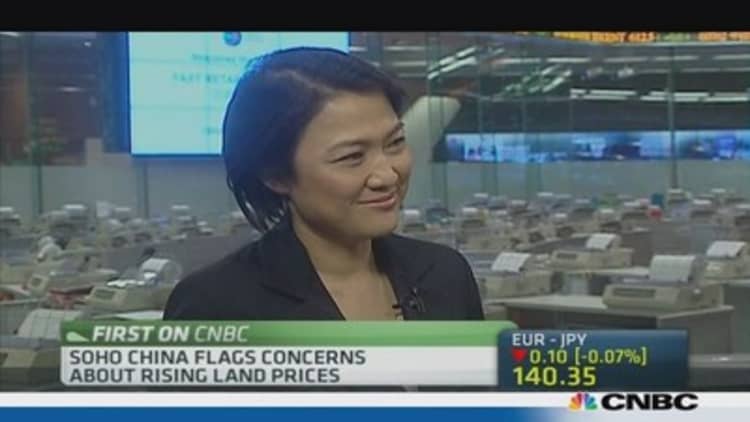
China's tight liquidity conditions are "troubling," said Zhang Xin, chief executive officer of Soho China, the country's biggest developer of prime commercial real estate, amid growing concerns of a correction in the country's red-hot real estate market.
"We are seeing less and less cash in the system. When we tried to sell two projects in Shanghai – there were hundreds of [inquiries] – but very few of them actually had the cash to complete the deal," Zhang told CNBC Asia's "Squawk Box" on Wednesday.
"When you sell something of that size, billions of yuan – then you realize how tight the liquidity is, that's troubling," she added.
Last week, the developer said it was selling two commercial buildings in Shanghai for a total of 5.23 billion yuan ($853 million) – below than the initial asking price – at a time of excess supply in the country's financial capital.
(Read more: Will a weaker yuan heighten China property risks?)
Zhang said the sales were part of the company's strategy to offload non-core assets and increase its cash on hand in order to prepare for a tighter credit environment.
"When we saw the first wave of credit crunch last summer, we knew it would continue and deepen. In addition to cutting back on acquisitions, we also tried to sell some of the non-core assets," she said.
"The market down the road will surely correct itself, we want to have plenty of cash that moment," she added.
When asked whether the recent depreciation in the yuan is a concern for Soho China, which has issued U.S. dollar-denominated debt, Zhang said she is closely watching developments with the currency.
(Read more: Why investors shouldn't fret yuan volatility)
"It's not clear if it's just a technical adjustment. It's too early to know. The next couple of months will be very key," she said.
Concerns over the mainland property market have been on the rise in the recent weeks following reports in late-February that the Industrial Bank – a mid-sized lender - had stopped issuing some new loans to property developers.
Meantime, China's home price rises eased for the first time in 14 months in January, climbing 9.6 percent from a year earlier, following a 9.9 percent rise in the previous month, according to Reuters.
Last month, property developers in two cities in eastern China began cutting prices in an effort to boost sales. This has started to push down valuations at similar developments in neighboring projects, according to local media.
Soho China, which focuses on prime office properties in Beijing and Shanghai, reported a 33 percent rise in net profit for 2013 to 4.44 billion yuan.
(Read more: Is China getting ready to widen the yuan's band?)
Zhang said while the company is assessing markets outside the two major cities – it has no plans to diversify its investments at the moment.
"We got to Guangzhou and Shenzhen – but the market is not mature enough on the demand side for us to move in. We are staying in Beijing and Shanghai - those markets are big enough," she said.
—By CNBC's Ansuya Harjani. Follow her on Twitter @Ansuya_H


